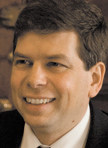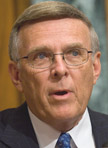Three senior Democrats on the Senate Commerce Committee have characterized the Federal Communication Commission’s national broadband expansion plans as inadequate — firmly rooting America as second class citizens in a global broadband market.
In three separate letters to FCC Chairman Julius Genachowski, the senators criticized the chairman’s plan for broadband targets set too low, both in vision and in speed.
Genachowski’s plan calls for Americans to have universal access to at least 4/1Mbps service no later than 2020, a goal Genachowski described as “an aggressive target.”
But in a letter obtained by CQ, Senator Daniel Inouye (D-Hawaii) noted that such speed goals were set low in comparison to other countries, many of which are on target to achieve 100Mbps broadband well before 2020.
“What is the FCC’s rationale for a vision that appears to be firmly rooted in the second tier of countries?” Inouye wrote.
Senator Mark Begich (D-Alaska) wanted to know how Genachowski settled for 4Mbps download speed, noting that seemed to him to be too modest.
In fact, speed goals in the National Broadband Plan were a major point of contention in the National Broadband Plan, with lobbyists from AT&T and Verizon pushing hard for the lowest possible speed goals. That is because they are the largest traditional landline providers saddled with aging copper wire networks which provide broadband to most rural Americans through DSL. Most Americans living outside of major population centers rely on phone company-delivered DSL service typically speed rated at 768kbps-3Mbps. Because DSL service is distance sensitive, a speed target of just 4Mbps requires a considerably lower investment than a target of 20Mbps or higher. It is likely 100Mbps service, outlined as a goal for at least 100 million Americans, will first be achieved through fiber and cable networks in large cities, and not from phone company DSL service.
The difficulty for rural Americans to achieve a fair shake in broadband was highlighted by Senator Byron Dorgan (D-North Dakota). He cited his state’s poor ranking — 42nd in broadband speed, as evidence Americans in rural states suffer with considerably lower quality broadband service. The FCC’s National Broadband Plan, Dorgan fears, may only recreate the digital divide, only with different levels of speeds.
If 100 million Americans can access broadband services at 100Mbps, a rural speed target of 4Mbps will make new, high bandwidth-dependent Internet services just as off-limits to rural America as basic broadband is today in many areas.
Genachowski promised to review broadband speed targets every four years, making adjustments when necessary to be certain rural Americans receive broadband service comparable to urban areas.
But with the wide disparity in speed goals for urban and rural America, that may be impossible in the short term, especially as telecom industry lobbyists continue to pressure Congress for less regulation and no government mandates.


 Subscribe
Subscribe




